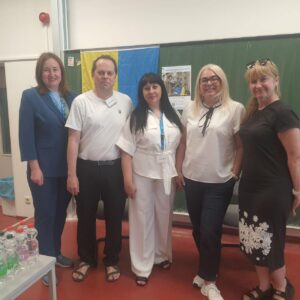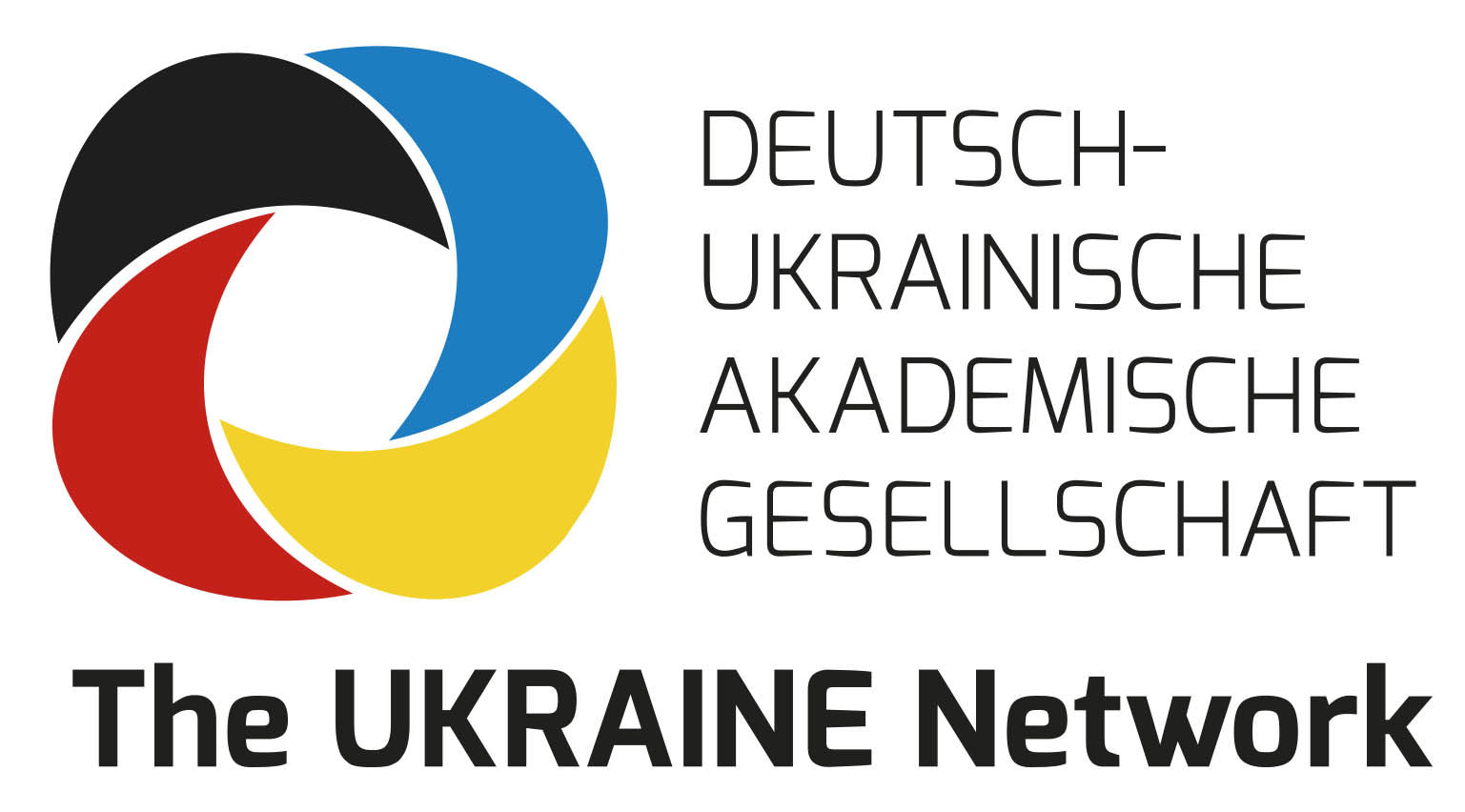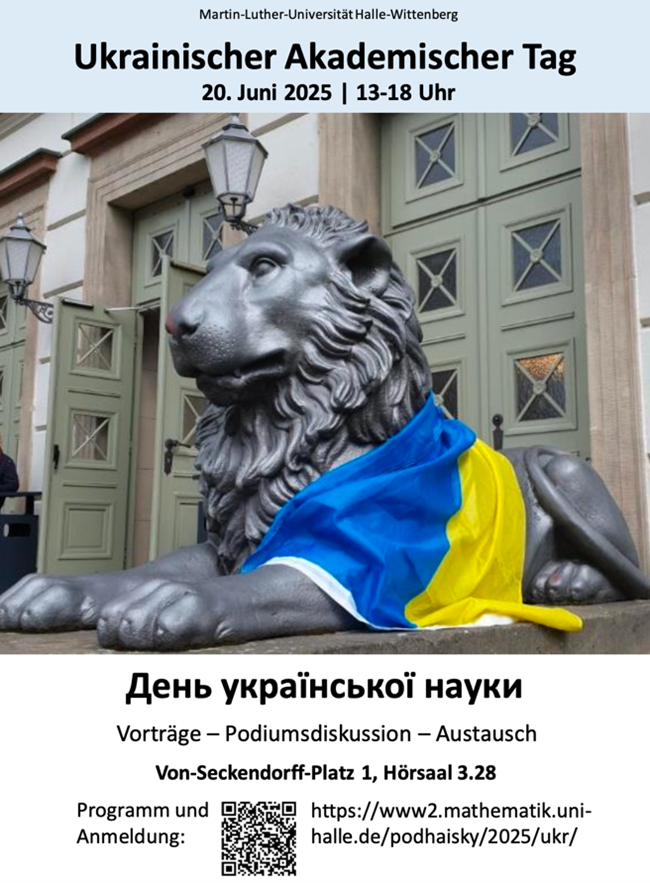
The 2nd Ukrainian Academic Day (Ukrainischer Akademischer Tag/ День української науки) was held at the Martin Luther University Halle-Wittenberg, Halle (Saale), Germany on on June 20, 2025. The event gathered scholars, educators, civil society actors, and representatives of Ukrainian and German institutions, aiming to foster interdisciplinary dialogue and strengthen academic cooperation amidst the ongoing challenges posed by the war in Ukraine. Building on the experience of previous academic initiatives, the Ukrainian Academic Day in Halle (Saale) offered a dynamic platform for knowledge exchange, institutional partnership, and reflection on academia’s role in supporting societal resilience. Through thematic panels, the event addressed issues of media representation, multilingualism, psychological support, and the multifaceted consequences of war, reaffirming the importance of academic engagement in times of crisis.
Report was prepared by Dr. Iryna Shvetsova. Photos: private
The event was co-organized by Dr. Helmut Podhaisky (Martin Luther University Halle-Wittenberg (MLU-Halle), Germany), Dr. Iryna Shvetsova (Kherson State Maritime Academy, Ukraine), and Dr. Ole Hensel (Martin Luther University Halle-Wittenberg, Germany). It was held in collaboration with the International Office of MLU-Halle, Kherson State Maritime Academy, Leuchtturm Helfer e.V., CRISP e.V., and Open Platform e.V. / Alliance of Ukrainian Organisations (AOU), with support from the Federal Agency for Civic Education (bpb).
A particular honor was the presence of Nataliia Chernopashchenko, Advisor at the Embassy of Ukraine in the Federal Republic of Germany, whose participation emphasized the importance of academic cooperation as a cornerstone of cultural and diplomatic relations between Germany and Ukraine.
The day was opened by Prof. Raphael Kruse, Dean of Studies of the Faculty of Natural Sciences II, who stressed the importance of interdisciplinary academic exchange in times of crisis.
Opening Panel Discussion: Rethinking Representation of Ukraine
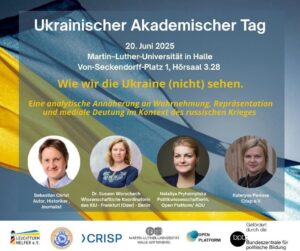 This panel, entitled “How We (Do Not) See Ukraine: Analytical Reflections on Perception, Representation and Media Narratives in the Context of Russia’s War”, explored the shifting perceptions of Ukraine in German society, media, and academia since the beginning of the full-scale invasion. Moderated by Kateryna Pavlova (CRISP e.V.), the panel featured:
This panel, entitled “How We (Do Not) See Ukraine: Analytical Reflections on Perception, Representation and Media Narratives in the Context of Russia’s War”, explored the shifting perceptions of Ukraine in German society, media, and academia since the beginning of the full-scale invasion. Moderated by Kateryna Pavlova (CRISP e.V.), the panel featured:
- Sebastian Christ, journalist, historian, and author (Berlin)
- Dr. Susann Worschech, coordinator of the interdisciplinary Ukraine studies network KIU (Frankfurt/Oder – Berlin)
- Nataliya Pryhornytska, political scientist and co-founder of Open Platform e.V. / AOU (Berlin)
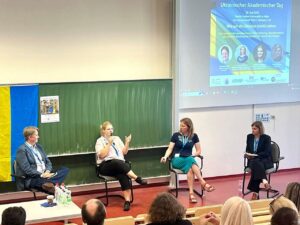 The discussion highlighted the urgency of including Ukrainian perspectives in public discourse and rethinking dominant narratives.
The discussion highlighted the urgency of including Ukrainian perspectives in public discourse and rethinking dominant narratives.
Focus Area I: Multilingualism and Psychological Support
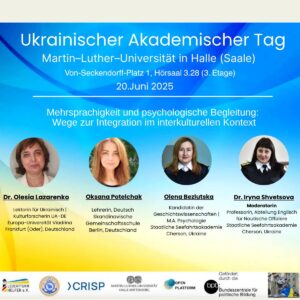 This session addressed the linguistic and psychological dimensions of integration in an intercultural context. Moderated by Dr. Iryna Shvetsova, the session included:
This session addressed the linguistic and psychological dimensions of integration in an intercultural context. Moderated by Dr. Iryna Shvetsova, the session included:
- Dr. Olesia Lazarenko (European University Viadrina): “Ukrainian Language in Germany: A Linguodidactic Perspective”
- Oksana Potelchak (German-Scandinavian School / Open Platform e.V. / Alliance of Ukrainian Organisations e.V.): “Multilingualism as a Key to Integration”
- PhD Olena Bezlutska (Kherson State Maritime Academy): “Psychological Support under Conditions of War”
Speakers emphasized the importance of addressing the integration holistically, combining educational, linguistic, and psychological strategies to support displaced persons and host communities alike.
Focus Area II: Injuries Caused by War
This session addressed the complex physical, ecological, and social consequences of the war in Ukraine. Moderated by Dr. Yuliia Slobodian, the panel included:
- Dr. Alexander Gussew, who spoke on integrating Ukrainian researchers into German medical institutions
- Marina Golivets, who highlighted the environmental damage caused by war
- Ivan Tkachenko, who discussed how the first aid is provided under combat conditions
- Dr. Tobias Kunath, who focussed on surgical treatment of war injuries during conflict
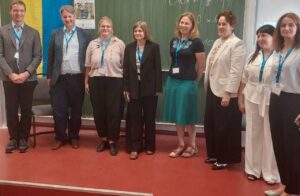 A Space for Knowledge, Reflection, and Solidarity
A Space for Knowledge, Reflection, and Solidarity
The 2nd Ukrainian Academic Day served not only as a platform for academic dialogue but also as a space for collective reflection on the impact of war. Through interdisciplinary panels, personal insights, and professional exchange, the event underscored the role of academia in promoting resilience, deepening mutual understanding, and supporting democratic values in times of crisis.